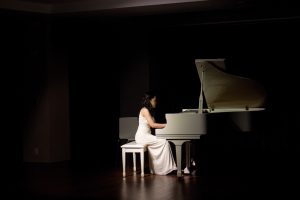Veteran teachers know–every morning in front of the bathroom mirror–that radical education reform is possible. Change starts with a choice.
This is my 34th year in the teaching profession. I’ve certainly changed my stripes many times. Sometimes it has involved trying a new approach, or a new rhythm to classroom instruction. Some tweaks were minor, others profound. It has always been a gamble, but taking risks is built into the teaching formula. This time, change sent me to the other side of the planet.
A Dare and a Challenge

I chose to come to BASIS International School Shenzhen to teach music the day Anthony Bourdain died. I had just watched his show on Hong Kong, and China was very much on my mind. Over the years, Bourdain had a lot to say about China.
“The one thing I know for sure about China,” he once said, “is that I will never [completely] know China. It’s too big, too old, too diverse, too deep. That’s for me the joy of China, facing a learning curve that impossibly steep…That’s exciting. It’s too much and it’s changing so fast.”
To be honest, I had tuned in to Bourdain’s Hong Kong episode to convince myself that the offer I had just received to teach for BASIS International Schools across the bay in Shenzhen was too much change. I was certain I would be dissuaded by a world too exotic, too foreign, too…unteachable. I was wrong.
There was a dare in Anthony Bourdain’s words. And I rarely turn down a good challenge.
Teaching Music in China
I also wanted to satisfy my curiosity. Musical instrument sales in the United States are plummeting. There are many reasons for this. For instance, rap and pop star idols hold microphones; most don’t perform while playing instruments. Neither do their millions of fans. In addition, many school districts have cut music classes, which also has led to the declining interest in instrumental music.

But in China, industry experts tout radically different statistics. For instance, there are over 30 million pianists in China. Steinway & Sons, the world’s leading maker of pianos, says the company would be bankrupt without the large market in China. There are also 10 million violinists here, and instrumental music is still a vibrant artistic genre. I wanted to see this firsthand and see what that musical energy looks like in the classroom. I have not been disappointed. The hallways at BASIS International School Shenzhen are teeming with musical talent. Students I’ve never met pop by and sit down at my classroom piano, just to play a few bars of a Mozart sonata.
“The Journey Changes You”
The move to Shenzhen has been filled with surprises. Many things don’t work the way I’m accustomed to in the United States. (Granted, the same can be said for most foreign countries.) For instance, I don’t speak Mandarin beyond a few functional phrases. This makes communication with people in many shops and businesses extremely difficult. Most Shenzhen residents are polite and helpful, however, and there are phone translation apps that allow for slow–but successful–communication. It’s far easier to communicate while I’m on campus, however. As an international school, English is required of all students.
Shenzhen’s expat community is a tight network, and we look after each other. There are chat groups on WeChat–our social network site, which is commonly used across the community and the country. These groups involve expats who work at other schools, and in other industries, and provide a nice lifeline that dilutes the isolation of living on the other side of the world. I’ve lived in other countries, and Shenzhen is no more complicated than other places. While living in China can sometimes be hard, it is always very gratifying.
Again, Bourdain:
“Travel isn’t always pretty. It isn’t always comfortable. Sometimes, it hurts. But that’s okay. The journey changes you; it should change you. It leaves marks on your memory, on your consciousness, on your heart. You take something with you. Hopefully, you leave something good behind.”
If you swap the word “teaching” for “travel,” Bourdain’s quote is also an accurate description of the music profession, and the art and profession of teaching, to which I have devoted my life. Coming to China wasn’t an escape from teaching; it was a chance for me to push the boundaries of everything I’ve learned and everything I’ve wanted to give back.
And Bourdain was right. It’s a steep learning curve. But that curve has always been a daunting challenge, ever since the first day I walked into a classroom. Teaching will always be a two-way exchange of taking in as much as you give out.
So, as we love to say in BASIS Curriculum Schools around the world: get out your CJs and let’s get started!
– Brian DeLay is a music teacher at BASIS International School Shenzhen